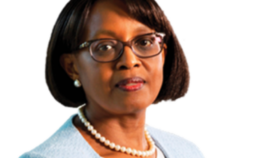24/05/19
Africa urged to accelerate control of cervical cancer

Send to a friend
The details you provide on this page will not be used to send unsolicited email, and will not be sold to a 3rd party. See privacy policy.
Africa needs to urgently eliminate the burden of cervical cancer which remains a public health problem in the region despite being one of the most preventable forms of cancers, experts say.
Cervical cancer, a disease which affects the part of the female reproductive system called cervix, is fatal if not detected and treated early.
According to the WHO, the disease — mainly caused by the sexually transmitted human papillomavirus (HPV) — killed 311,000 women in 2018 globally, with about 85 per cent of the deaths occurring in low- and middle-income countries.
“Implementation of a comprehensive cervical cancer prevention and control [programmes] will contribute to the attainment of the Sustainable Development Goals.”
Prebo Barango, The WHO Office, Zimbabwe
“With rates for cervical cancer up to six times higher in the African region than in North America, we can see that the disease is one of inequity,” says Matshidiso Moeti, director of the WHO Regional Office for Africa, in a statement released by the WHO Regional Office for Africa last week (15 May). “We expect the new global strategy to close this gap.”
A meeting organised last week (13-15 May) by the WHO Regional Office for Africa in Brazzaville, Republic of Congo, for member states reviewed the draft of the global strategy towards cervical cancer elimination.
The global strategy calls for 90 per cent of women by age 15 years to be fully vaccinated, 70 per cent of women to be screened with a high-precision test by 35 years of age and 90 per cent of women with the disease to be receiving appropriate treatment and care.
Prebo Barango a medical officer at the WHO Office in Zimbabwe, who attended the meeting, tells SciDev.Net that Africa faces a number of challenges in fighting the disease.
“Access to HPV vaccines, screening services and treatment is limited due to either unavailability of the services or unaffordability of related costs by families,” explains Barango, adding that low health literacy and information on the early signs and symptoms of the disease is a challenge.
According to Barango, African governments ought to develop and implement a comprehensive strategy along the life course of the disease, with age-specific interventions across the prevention and control continuum.
“Key interventions include HPV vaccination for girls aged nine to 14 years along with healthy sexuality education for boys and girls, and screening of eligible women for precancerous lesions coupled with prompt treatment of those [found to be] positive,” he says. “Implementation of a comprehensive cervical cancer prevention and control [programmes] will contribute to the attainment of the Sustainable Development Goals.”
Barango adds that local health initiatives that involve young women as champions and promoters of their own health have a vital role to play in educating the population of the importance of vaccinations and screening.
Hudson Alakonya, a doctoral research fellow in oncology at the UK-based University of Oxford and the co-founder and director of Cancer Research Kenya, tells SciDev.Net that most African countries do not have highly trained and skilled human resource to fight the menace.“One area where we lag behind in the war against cancer in Africa is lack of research oncologists who can aid in formulating and implementing effective evidence-based cancer awareness sessions,” he says.
“If we can establish screening programmes that will enable every woman who is at risk of developing cervical cancer to have screening, then we will be able to defeat cancer.”
This piece was produced by SciDev.Net’s Sub-Saharan Africa English desk.













